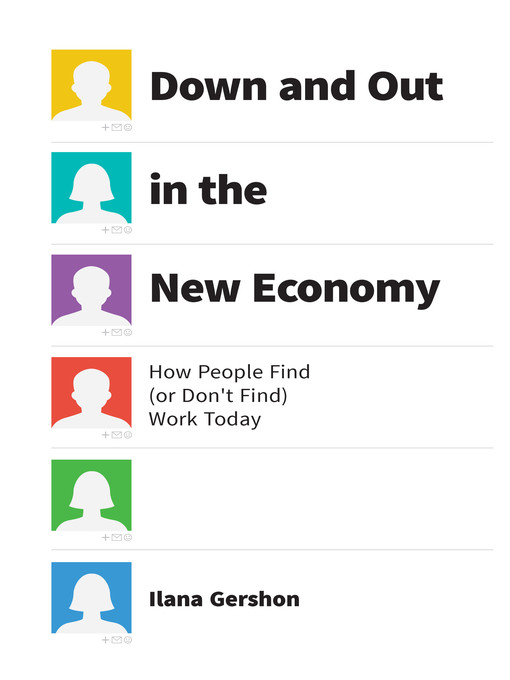
Down and Out in the New Economy
How People Find (or Don't Find) Work Today
کتاب های مرتبط
- اطلاعات
- نقد و بررسی
- دیدگاه کاربران
نقد و بررسی

March 27, 2017
Gershon (The Breakup 2.0), an associate anthropology professor at Indiana University, wants to help readers “see more clearly the challenges of job searching and... make more thoughtful employment decisions,” but readers expecting useful advice on landing that next new job should look elsewhere. This is fundamentally a book that observes—at a distance—how “everything about job searching has changed.” That change is the book’s foundation, as it focuses on how people have shifted from offering skills to the job marketplace to offering themselves as a “business of one.” Gershon did plenty of homework (conducting 165 interviews and attending 54 related workshops), more than enough to explain the concept of personal branding, being “unique in the right way,” and successfully communicating those qualities via various online outlets. As the author discusses some concepts—informational interviewing, for example—her points become a little muddy. After a discussion of LinkedIn, for instance, it’s anyone’s guess whether Gershon thinks it’s a good resource or not. Still, she introduces concepts that, while perhaps not directly helpful, may still assist readers in thinking differently about jobs and what they mean for one’s future rather than just the present.

March 1, 2017
Gershon (anthropology, Indiana Univ.; The Breakup 2.0: Disconnecting over the New Media) makes it clear in her aptly titled preface, "A Book About Advice, Not an Advice Book," that her book is not a job-search, self-help volume. Instead, the author examines the practices of job seekers, career counselors, HR professionals, recruiters, and hiring managers from the lens of a social scientist. Gershon and her colleagues interviewed legions of job seekers and career professionals, and observed numerous job search presentations and workshops. Attention is paid to such concepts as "genre repertoires," "language ideologies," "personal branding," "serendipitous vs. strategic networking," and, most notably, "self-as-business." Primary among Gershon's conclusions is that much of what is being touted by career counselors and motivational speakers is largely inconsistent with or irrelevant to the actual practices of those making hiring decisions. VERDICT Although some topics such as cover letters and preemployment testing are largely ignored, this is a provocative work that will be of particular interest to social scientists, career development specialists, and hiring professionals.--Alan Farber, Univ. of North Carolina, Chapel Hill
Copyright 2017 Library Journal, LLC Used with permission.

March 15, 2017
An anthropologist explores the hiring practices of employers in a digital era.To conduct the research for her second book, Gershon (Anthropology/Indiana Univ.; The Breakup 2.0: Disconnecting Over New Media, 2010) left the classroom temporarily and relocated to Northern California, where she interviewed job seekers and potential employers and mined existing data to seek a paradigm for job searching in a gig economy. She contrasts that economy with previous eras, when job applicants sent a typed resume by snail mail to a human resources office and waited for a reply. Those workers who were eventually hired could often count on employment for life, a vested pension, and health insurance. However, -over the past thirty years,- writes the author, -the employment contract and what it means to be a worker in general have changed. Workers are living anxious, unstable lives in which they are told they must shoulder most of the responsibility for changes in today's economy....Instead of company loyalty, you are now expected to feel passion for your vocation and to be driven to prioritize work over all other obligations.- Gershon's research verified what she had already sensed: that job applicants face floods of other applicants because job opportunities are so easy to locate, that a standard paper resume is no longer adequate, that job seekers rarely expect longevity if hired, and that employers often view new hires as project-based workers rather than permanent employees. The author suggests that applicants could benefit from viewing themselves as one-person businesses, marketing themselves to potential employers on a business-to-business basis. That paradigm would assume that moving on after a project is completed constitutes the new normal. Gershon bolsters her theories with a chapter on the viewpoints of those tasked with handling the hiring for employers. Throughout, the writing is easy to digest, but the repetition is tiring, and even at 250 pages, the book feels too long. An intermittently useful book that could have been a long-form magazine feature.
COPYRIGHT(2017) Kirkus Reviews, ALL RIGHTS RESERVED.

























دیدگاه کاربران